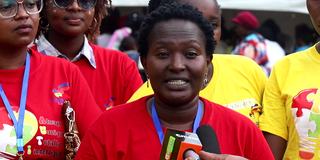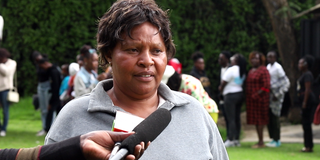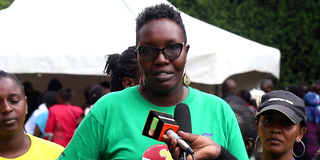Behind closed doors: The silent struggles of Nakuru mothers raising autistic children

Faraja Initiative founder Judy Ligala during an interview on Autism Acceptance Day held at Trinity Chapel Nakuru on April 5,2025.
In many homes, a silent battle is waged behind closed doors, and parents raising children with autism often face an uphill battle of isolation, misunderstanding and a deep sense of invisibility.
Families of autistic children speak of a reality marked by stigma, limited support systems and inadequate access to medical, educational and therapeutic services, and while public awareness of autism has increased in recent years, true acceptance remains painfully out of reach for many.

Regina Wanjiru shares that 30 years of caring for an autistic child has not been easy. His husband who supported her with caring for their son died when he was 15 years and she was left as the primary caregiver.
Speaking at the Autism Acceptance Day event at Trinity Chapel, Regina Wanjiru says people may have heard about autism, but the reality of caring for and accepting an autistic child is out of reach for many.
Ms Wanjiru says she has been the main caregiver for her 30-year-old autistic son, supporting him in every way.
"My husband died when my son was 15 years old and since then it's been me and him against all the challenges that come our way," she says.
Ms Wanjiru reveals that caring for her son has been an uphill task because he is all grown up and sometimes it's hard to control him when he gets agitated, noting that he is stronger and easily overpowers her.
It was a problem growing up to find the right school for her son.
Another parent, Rahab Mathu, mother of a seven-year-old boy on the spectrum, says very few people really understand what it means to raise an autistic child.

Rahab Mathu, a parent of a seven year old boy living with autism. She shares the importance of having someone holding your hand as a caregiver noting that Faraja has linked her with a community she can count on.
"When we come together, the journey becomes easier," says Rahab. "You realise you're not alone, and you learn things you wish someone had told you sooner."
For many, the journey of parenting an autistic child begins with confusion. Diagnoses are often delayed or missed altogether due to a lack of information and access to specialists.
In rural and low-income areas, resources are even scarcer and parents are often left to navigate this unfamiliar terrain alone.
It is for this reason that Faraja founder Judy Ligaga came up with the idea of an event that would bring together caregivers of autistic children and various stakeholders to start a conversation about autism.
She says that beyond the medical hurdles lies the emotional toll. Many caregivers carry the burden in silence, fearing stigma from extended family, neighbours or their faith communities.
Children are often kept indoors, hidden away, not because their parents are ashamed, but because society has yet to create a safe, accepting space for them.
"We are speaking out because we want to dispel the myths and misinformation that still surround autism. Some believe it is a curse or a punishment. Others see autistic children as disruptive or even dangerous, a perception that further isolates families and pushes them away from community life," she says, noting that it is important to have courageous conversations at the community level and in places of worship.
In addition, she notes that working with parents who are struggling with how to educate their children provides them with information on how to approach government agencies that deal with autistic children.
"Most parents do not know about the educational assessment process that is done by the government so that their children can be placed in the right learning level. Today we had representatives from educational assessment offices who did assessments to ensure that autistic children receive inclusive education," she notes.
Caregivers also struggle with the financial burden of raising a child with autism. Therapy sessions, special education resources and transportation to medical facilities all come at a cost that many cannot afford.
At Faraja Initiative, she says, the goal has always been to empower caregivers, not only emotionally, but also practically. They work with partners to train parents in life skills, such as planting kitchen gardens.
These small projects have made a real difference, providing food security and some financial relief to families already under immense pressure.
"We work closely with institutions such as the Differently Talented Society of Kenya (DTSK), hospitals and schools to bridge the information gap for families who are often left in the dark, acting as a liaison between caregivers and the necessary agencies they need to know about in order to access certain services," she notes.
Over the past three years, Faraja has directly impacted nearly 600 families, and Judy notes that parents now proudly bring their children to events. Caregivers who once carried silent shame are now smiling, connecting and accepting themselves.

